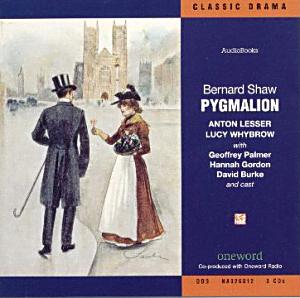Audiobook Review
Pygmalion by George Bernard Shaw
with Anton Lesser as Professor Higgins; Geoffrey Palmer as Colonel Pickering and Lucy Whybrow as Eliza Dolittle; with Hannah Gordon as Mrs Higgins; David Burke as Doolitle, Kate Binchy as Mrs Pearce and Charles Simpson as Freddie Eynsford Hill.
NAXOS NA326812 3 CDs

"I don't want to talk grammar, I want to talk like a lady"
Eliza Doolittle, PygmalionPygmalion was, in Greek legend, the misogynist King of Cyprus who fell in love with a beautiful ivory statue, Galatea. Taking pity on him the goddess Aphrodite blew breath into the statue and made it come alive as a beautiful woman. Pygmalion then married his own creation which George Bernard Shaw insisted did not occur, in his play, between the creator, Professor Henry Higgins and his creation of a lady from a cockney flower seller, Eliza Doolittle.
Of course, Shaw's Pygmalion is today best known in its more palatable, politically correct adaptation as My Fair Lady with Eliza indeed marrying Higgins. Incidentally, Shaw's play was filmed in 1938 (gaining Halliwell's 4-star approval!) starring Leslie Howard as Henry Higgins and Wendy Hiller as Eliza. Halliwell remarks: "Perfectly splendid Shavian comedy of bad manners, extremely well filmed and containing memorable lines and performances."
Here then is the original play with Higgins a crusty old bachelor, tactless, with no feelings, ruthlessly exploiting Eliza to win his bet with a more sympathetic Colonel Pickering to turn the flower girl into a Duchess, to make her 'speak proper'. The balls, garden parties and race events on-screen and stage in My Fair Lady do not exist or are off-stage in this Pygmalion. Only in the hilarious tea party scene at Higgins's mother's home in the company of the Eynsford Hills, do we have the opportunity of hearing Eliza's progress as she charms Freddy and Clara with the 'new small talk' : "Gin was mother's milk to her"and "Walk!"Not bloody likely!" And the play ends with Eliza thoroughly disgusted with Higgins for ignoring her part in his triumph. She throws a tantrum and storms off to marry Freddy Eynsford Hill.
Anton Lesser makes a cantankerous Higgins, Lucy Whybrow a lusty, feisty Eliza although her prolonged oughwwws tend to be very much over the top in the early scenes when Higgins brushes against her Cockney brogue. An unusually subdued Geoffrey Palmer is a sympathetic Colonel Pickering. Hannah Gordon is suitably disapproving and ironic as Henry Higgins long-suffering mother.
After attempts to give the play a happy ending with Eliza and Henry Higgins joined together, Shaw remonstrated by adding the Epilogue that is also appended here as CD3. Rather tediously, it has to be said, it relates what happens to the characters after Eliza marries Freddy and how they survive and relate to each other. As John Tydeman remarks in his perceptive booklet notes, the 'made-over' Eliza is really nothing but "a doll who speaks beautifully, knows how to move and to wear fine clothes". Shaw was in the business of down-to-earth moralising and social observation - he realised she had much more to learn.
Ian Lace
[not rated]
Return to Index